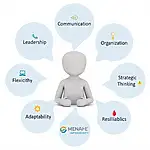The topic “describe a skill you want to improve this year” is a common theme in IELTS Speaking tests. It allows candidates to demonstrate their ability to discuss personal goals and self-improvement, which are highly valued skills in academic and professional settings. This topic has appeared frequently in past IELTS exams and is likely to remain relevant in future tests.
Part 1: Introduction and Interview
In this section, the examiner may ask questions related to skills and self-improvement. Here’s a sample question with a suggested answer:
Examiner: Do you think it’s important to continually improve your skills?
Candidate: Absolutely. In today’s rapidly evolving world, I believe it’s crucial to constantly enhance our abilities. Continuous skill improvement not only boosts our professional competence but also contributes to personal growth and adaptability. It helps us stay relevant in our careers and tackle new challenges more effectively.
Part 2: Long Turn
Here’s a sample cue card related to the topic:
Describe a skill you want to improve this year
You should say:
- What the skill is
- Why you want to improve it
- How you plan to improve it
- And explain how this improvement will benefit you in the future
Sample Answer (Band 6-7):
The skill I want to improve this year is public speaking. I’ve always been a bit nervous when it comes to speaking in front of large groups, but I realize it’s an important ability in both personal and professional settings.
I want to improve this skill because I believe it will boost my confidence and help me communicate my ideas more effectively. In my job, I often need to give presentations to colleagues and clients, so being a better public speaker would definitely enhance my performance.
To improve, I plan to join a local Toastmasters club where I can practice speaking regularly in a supportive environment. I’ll also watch TED talks to learn from experienced speakers and try to implement their techniques. Additionally, I’m going to volunteer to present more often at work to get real-world practice.
I think this improvement will benefit me greatly in the future. It will help me advance in my career by making me more effective in meetings and presentations. Also, it will make me more comfortable in social situations where I might need to speak to groups. Overall, I believe becoming a better public speaker will open up new opportunities for me both professionally and personally.
Sample Answer (Band 8-9):
The skill I’m ardently focusing on improving this year is data analysis, particularly in the realm of machine learning and artificial intelligence. In our increasingly data-driven world, the ability to extract meaningful insights from complex datasets has become indispensable across various industries.
My motivation to enhance this skill stems from its pivotal role in driving innovation and informed decision-making in my field of work. As a budding data scientist, I recognize that proficiency in advanced data analysis techniques will not only augment my professional capabilities but also enable me to contribute more significantly to cutting-edge projects.
To achieve this goal, I’ve devised a multi-faceted approach. Firstly, I’ve enrolled in an online specialization course offered by a renowned university, which covers advanced statistical methods and machine learning algorithms. Secondly, I’m actively participating in Kaggle competitions to gain hands-on experience with real-world datasets and collaborate with experts globally. Additionally, I’ve joined a local data science meetup group where I can engage in thought-provoking discussions and stay abreast of the latest industry trends.
The potential benefits of improving this skill are manifold. In the short term, it will enhance my problem-solving abilities and make me a more valuable asset to my current organization. Looking ahead, this expertise will open doors to more challenging and rewarding roles in the tech industry. Moreover, the analytical mindset cultivated through this process will be invaluable in navigating complex challenges both in my professional and personal life.
 Data analyst improving skills through online courses and practice
Data analyst improving skills through online courses and practice
Follow-up Questions:
- How long do you think it will take to significantly improve this skill?
- Are there any potential obstacles you might face while trying to improve this skill?
Sample Answer (Band 6-7):
I think it might take several months to see significant improvement. The main obstacle could be finding enough time to practice consistently with my busy schedule.
Sample Answer (Band 8-9):
The journey of skill enhancement is ongoing, but I anticipate seeing tangible progress within 6-12 months. The primary challenge I foresee is balancing the intensive learning process with my professional commitments, but I’m prepared to make the necessary sacrifices to achieve my goal.
Part 3: Two-way Discussion
Examiner: How do you think technology has changed the way people learn new skills?
Candidate (Band 6-7):
Technology has greatly impacted how people learn new skills. Now, we can access online courses and tutorials easily, which makes learning more convenient. We can also use apps on our phones to practice skills like languages or coding. It’s made learning more flexible and accessible to many people.
Candidate (Band 8-9):
Technology has revolutionized the landscape of skill acquisition. The proliferation of Massive Open Online Courses (MOOCs) and interactive learning platforms has democratized education, making high-quality instruction accessible to a global audience. Adaptive learning technologies, powered by artificial intelligence, now offer personalized learning experiences tailored to individual needs and learning styles. Moreover, virtual and augmented reality applications are providing immersive learning environments for skills that traditionally required physical presence, such as surgical techniques or complex machinery operation. This technological integration has not only enhanced the efficiency of skill development but also fostered a culture of lifelong learning.
Examiner: Do you think there are any disadvantages to relying too much on technology for learning?
Candidate (Band 6-7):
Yes, there can be some drawbacks. People might become too dependent on technology and lose important face-to-face interaction skills. Also, it’s easy to get distracted when learning online, which can affect the quality of learning. Some people might also miss out on hands-on experience that’s important for certain skills.
Candidate (Band 8-9):
While technology offers numerous benefits, over-reliance can indeed have detrimental effects on the learning process. Excessive screen time can lead to digital fatigue and reduced attention spans, potentially hampering the deep, focused learning necessary for mastering complex skills. There’s also a risk of diminishing critical thinking abilities as learners become accustomed to having information readily available at their fingertips. Furthermore, the lack of immediate feedback and personal interaction in some online learning environments can impede the development of crucial soft skills like effective communication and collaboration. It’s essential to strike a balance between leveraging technological advantages and maintaining traditional learning methods that foster holistic skill development.
 Technology's impact on skill learning
Technology's impact on skill learning
Key Vocabulary and Phrases for High Scores
-
Ardently (adverb) /ˈɑːrdntli/ – With great enthusiasm or passion
Example: She ardently pursued her goal of becoming a concert pianist. -
Indispensable (adjective) /ˌɪndɪˈspensəbl/ – Absolutely necessary
Example: In today’s job market, computer skills are indispensable. -
Augment (verb) /ɔːɡˈment/ – To make larger; enlarge or increase
Example: He took extra courses to augment his knowledge in the field. -
Pivotal (adjective) /ˈpɪvətl/ – Of crucial importance
Example: Her decision to change careers was a pivotal moment in her life. -
Multi-faceted approach (phrase) – A strategy that considers many different aspects of a situation
Example: The company adopted a multi-faceted approach to solving the complex problem. -
Abreast (adverb) /əˈbrest/ – Up to date with the latest news, ideas, or information
Example: It’s important to stay abreast of technological advancements in our field.
Tips from an Examiner
-
Practice regularly: Set aside time each day to practice speaking English, even if it’s just for 10-15 minutes.
-
Record yourself: This allows you to identify areas for improvement in your pronunciation, fluency, and grammar.
-
Expand your vocabulary: Learn new words and phrases related to common IELTS topics and practice using them in context.
-
Use a variety of sentence structures: Demonstrate your language proficiency by using a mix of simple, compound, and complex sentences.
-
Stay informed: Read or watch news in English to stay updated on current affairs, which can be useful for discussing various topics.
-
Be confident: Even if you make mistakes, maintain a positive attitude and keep communicating. Confidence can significantly impact your overall performance.
Remember, improving your IELTS Speaking skills is a journey. Describe an important lesson you learned as a child – persistence and practice are key to success. By consistently working on your language skills and following these tips, you’ll be well-prepared to describe a skill that you would like to share with others in your IELTS Speaking test and achieve the score you desire.


